Skills are all the rage in L&D today. But at Degreed, we were into skills before the hype—and our experience has equipped us to lead the way forward.
We’ve bet on skills for nearly a decade. Why? To personalize workforce development, power change, deliver better outcomes, and provide our worldwide clients the best learning experiences possible.
- Our skill assessments help organizations assess, track, and understand their skills. We’ve facilitated nearly 50 million skill assessments and counting.
- We’ve parsed and inferred skill data to make learning more impactful.
- We introduced Skill Coach to help drive more meaningful development conversations.
All told, we’ve helped more than 4 million people evaluate their skills—and we’ve provided daily clarity to savvy L&D teams that understand the value of a skills-based strategy.
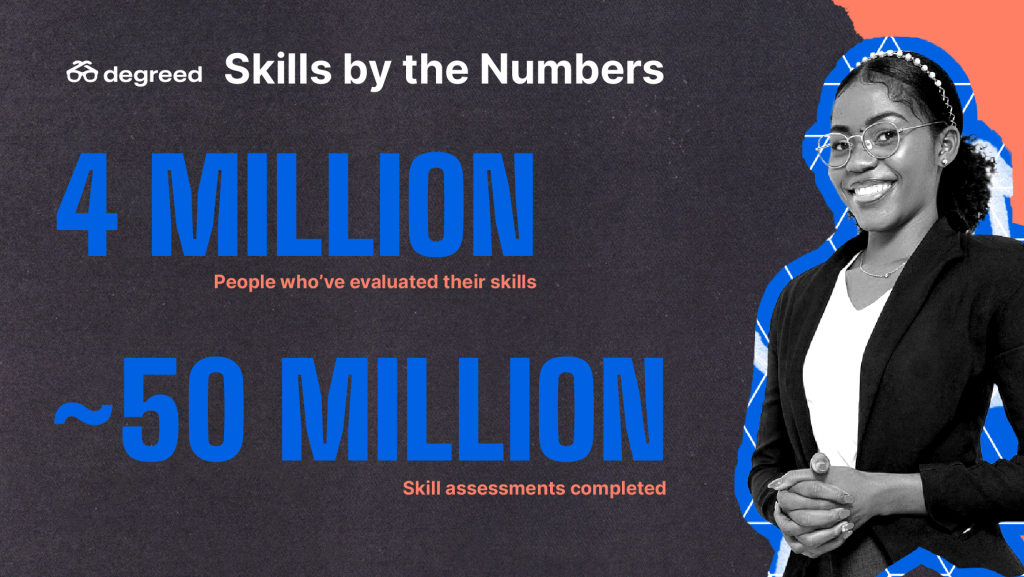
Yet our job isn’t done.
More and more, it’s hard for companies to take advantage of skills data. It comes from all over, in different formats, and requires some real data science to harness.
It all adds up to a messy challenge: You might be extracting data and analytics just fine. But chances are you’re finding it hard to take meaningful action on those insights.
Every customer we speak with has the same question: “Can you help us make this simple?”
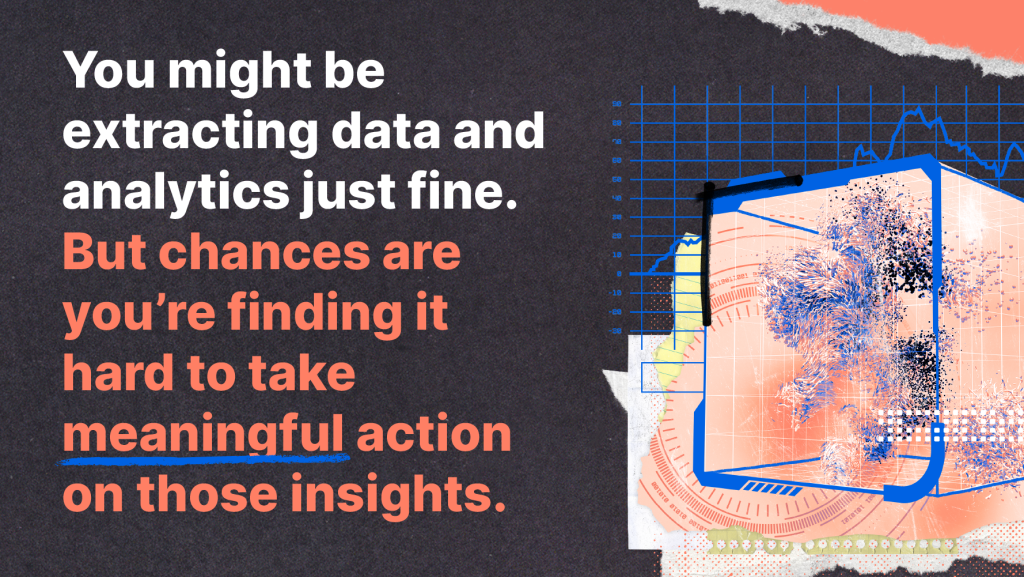
Introducing Degreed Skills+
Our new skills offering Degreed Skills+ empowers you to manage the complexity of your skill data and put it to work.
How did we get here?
In Spring 2024, we released capabilities that allow our customers to adjust and normalize their skill rating systems across their HR and learning technology stacks. We also set our sights on a broader ambition that enables you to do a better job creating and managing taxonomies, normalizing skill scales and labels from across your ecosystem, filling gaps in your skill data through inference, and visualizing skill data to uncover the skills you have, those you need, and next steps to fill gaps.
There’s a good chance you want to use the skills taxonomies you’ve built for your organization to manage and fuel your learning programs. With our new Skills+ capabilities, you can do that. When you bring your organizational skills to the table, Degreed will normalize all the data from our own platform, our content partners, and your core HR systems.
You choose one skills taxonomy. We’ll make it all work together.
We’ll also begin customizing the front end of Degreed based on the skill labels in your taxonomy. With Skills+, search, recommendations, and inference drive off your taxonomy.
Degreed Skills+ becomes an engine that configures your Degreed experience in real time. When you press publish, your entire Degreed instance transforms.
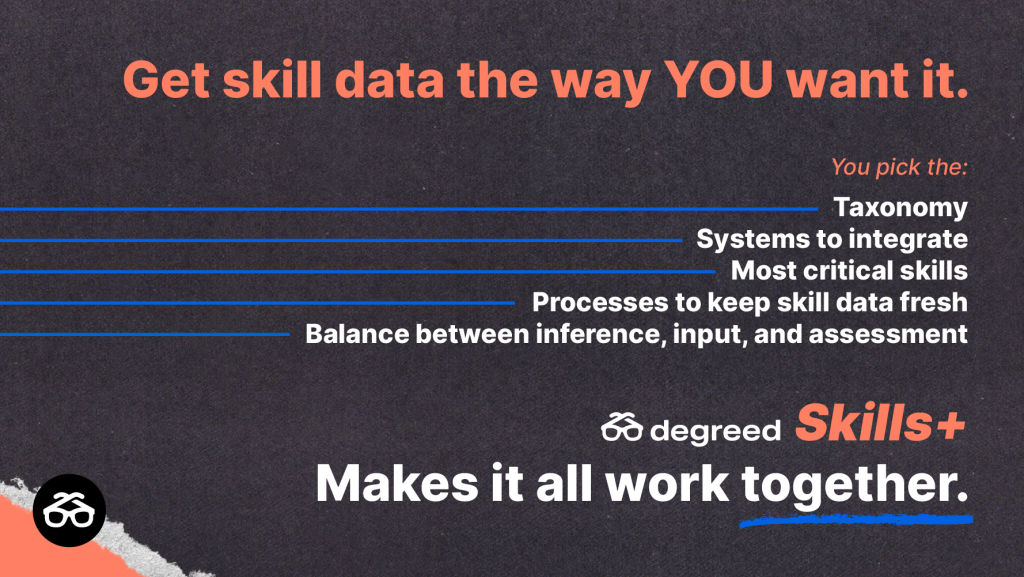
With Degreed Skills+, you set the taxonomy, you integrate the systems that matter, you identify the skills that matter most and how your organization wants to evaluate those skills, you set up the processes to keep skills data fresh, and YOU choose the balance between inference, input, and assessment.
Let’s take a closer look at what this all looks like:
Degreed Skills+ In Action
Managing skills across systems today is an incredibly daunting task. To work with our content partners, Degreed tracks and maps more than 200,000 distinct skill labels.
The average Degreed customer integrates with more than 30 other solutions. The typical integration setup results in skill data originating from just about everywhere.
We previously laid a foundation for you to create a baseline of common definitions of skill levels—across your organization, and within the Degreed platform.
Now we’re adding functionality to ingest, clean, update, and map skills to users, content, and operations where your employees engage in upskilling.*
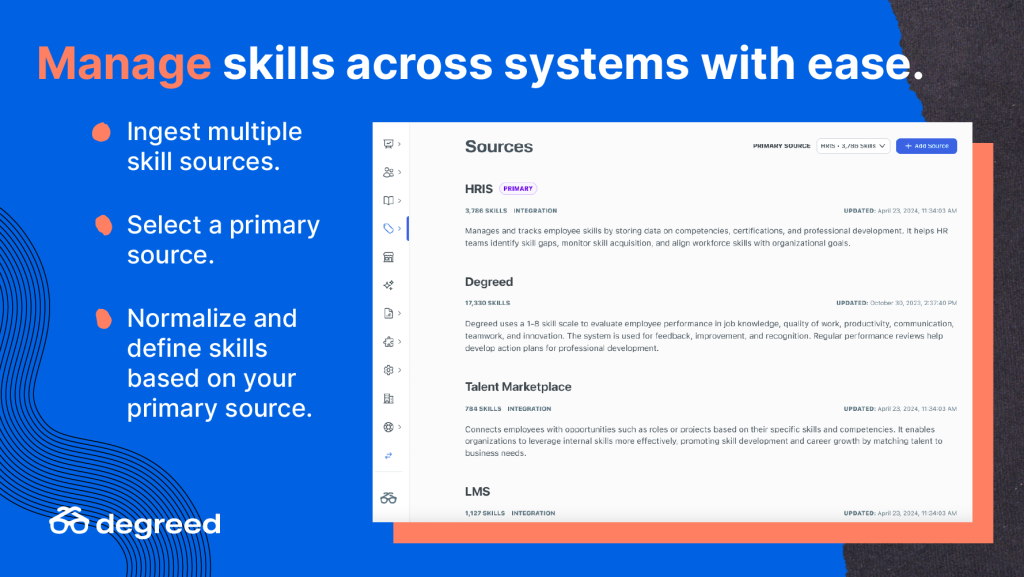
Using Degreed Skills+ you can ingest multiple skill sources. The most important part is ensuring that the skills that matter to your organization are used to drive a positive employee experience and achieve business outcomes. And that’s where we want to make it easy for you to focus.
We’ve heard over and over again that our customers want to be able to choose their skills and how those skills are defined. They want these skills mapped to their HRIS, and they want control. With Skills+, they get that.
For example, you can select your HRIS as your primary skill source and kick off the normalization process according to skills in the HRIS.
Our AI will process your HRIS skill labels and create suggestions, which you can manage by accepting or rejecting.
Let’s say the Degreed normalization process is done on the skill “AI-Augmented Innovation”. This process came up with some suggestions to enhance your skill data—such as default descriptions, translations across 10 languages, and default skill mappings.
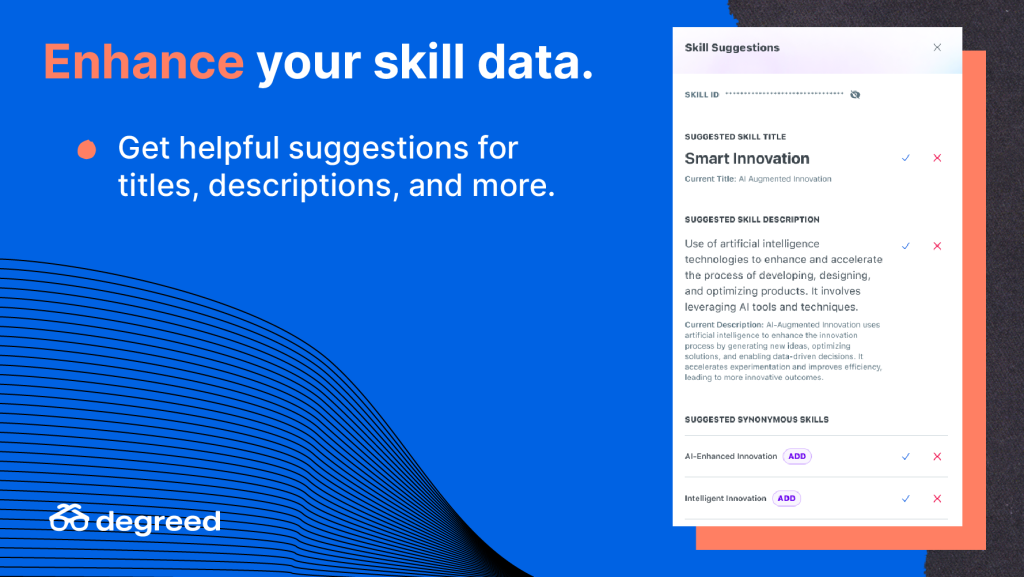
You can choose to reject recommended skill descriptions or names. For example, you can choose to reject recommended skill descriptions. Because for your organization, “AI-Augmented Innovation” is a critical skill that you need your teams to develop, to your standards.
You can also accept the synonyms our AI mapped to this skill. A mapping like this is the glue that ensures better data, better personalization, and more relevant learning.
Beyond defining skill descriptions, we also enable proficiency level descriptions specific to each skill, so you can define what each level of expertise means to your organization—and automatically tag learning content accordingly.
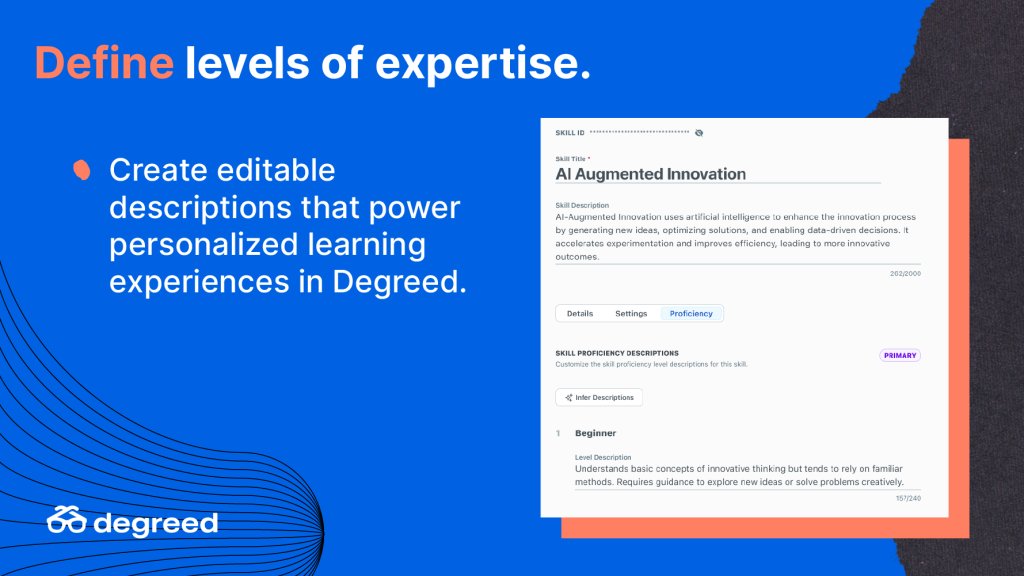
With a click of the button, you can create the editable descriptions that will power experiences throughout Degreed.
And the next part is particularly exciting.
Personalized Development at Scale
The most powerful thing about a great teacher, a great mentor, or a great boss is their care. Their empathy for your situation. Their understanding of your challenges.
But, until now, it’s been impossible to deliver this type of understanding at scale.
You have to balance a desire for great learning outcomes with the reality of budget requirements.
In the end, you compromise.
Skills data makes personalized learning at scale a possibility.
Impact Across the Employee Experience
When you press publish using Degreed Skills+, your entire Degreed front end changes.
Degreed is reconfigured so your employees are guided to interact with the skills relevant to their roles, their gaps, and your desired business outcomes.
No other vendor can do this. Degreed can.
Synonyms are merged to clean up duplicates. Irrelevant skills are archived. But most impactfully for your people, the experience changes.
Personalized recommendations become tailored to each employee’s skill profile and proficiency—aligned to the skills that are most important for your organization.
In the screenshot below, we’ve navigated to an employee profile for Jane, and “AI-Augmented Innovation” is a new suggested skill for her.
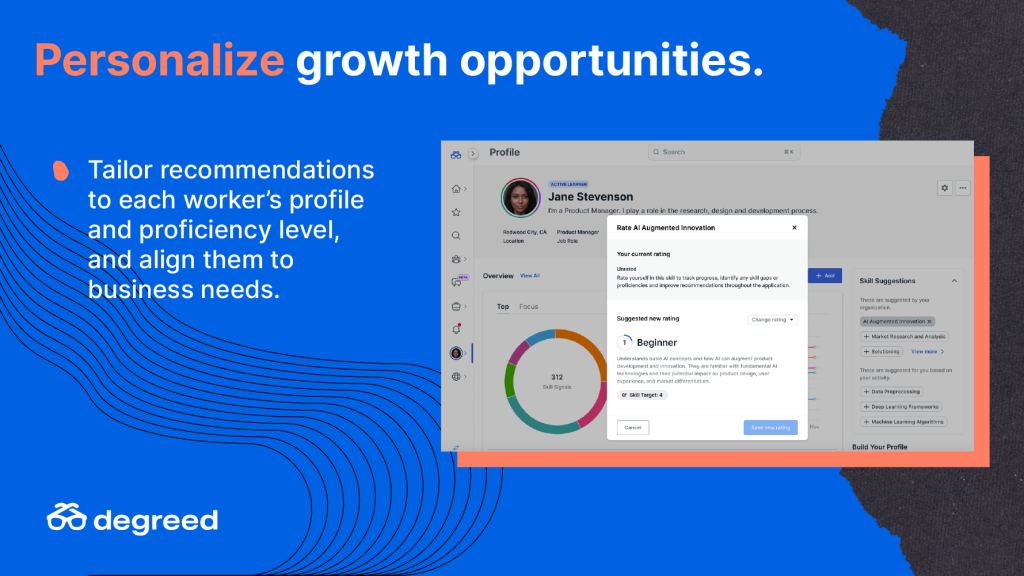
Jane can add it and rate it with custom level descriptions. And when it’s added to her profile, Jane can see all that important data around the skill that drives her experience.
In the end, this fosters growth and engagement, leading to better outcomes for your business.
Find out more.
Start using skills to transform your workforce.
Leading organizations around the globe use Degreed to tackle their skill challenges. You can see how Ericsson uses Degreed to power skills-based strategies.
Learn more about how Degreed can help you know, learn, and grow the skills your business needs. Get a Degreed demo.

*This functionality is on the Degreed product roadmap and coming soon.
